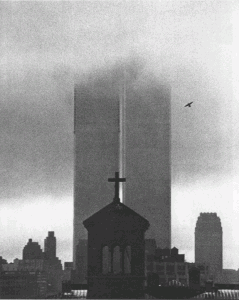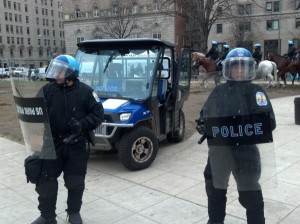In his classic 1997 novel Underworld, Don Delillo visualized the Cold War by the coincidence of finding on the front cover of one newspaper in 1951 of the first Soviet atomic weapons test and the “shot heard around the world,” the victory by the New York Giants over the Brooklyn Dodgers. More recently, W. J. T. Mitchell was struck that the front cover of the New York Times for September 11, 2001 had a lead story about cloning, leading to his book Cloning Terror, a visualization of the Bush era. Ironically, Delillo’s novel had André Kertesz’s somewhat sinister photograph of the World Trade Center on its front cover, seeming to foretell Bush’s post 9-11 “crusade.”
Today’s webpages have accounts of the shooting of Ramarley Graham in the Bronx by the NYPD and the continued upheaval in Egypt after the death of 75 football [soccer if you must] fans. The apparently contingent association resonates powerfully in the fashion of Delillo and Mitchell (and all good Surrealists). The connection here is the overreach of autocratic power, a countervisualization to their assertion “move on, nothing to see here.”
Since 9-11 the New York City police department have had a free hand to act as they choose, bolstered by their reputation as heroes on the day of the attacks and the decline in the crime rate. Most notably in the latter category, street crime of the kind for which New York was once notorious has notably declined, albeit not as much as you might think. The murder rate, according to official statistics declined precipitously from 2,016 in 1994 to 924 in 1998. It’s fallen further in the past decade but not that much: 866 murders were reported in 2010.
It looks as if Bloomberg has nonetheless decided to cut his police commissioner loose after this latest scandal. This week alone, three people have been shot and killed by police with Ramarley’s death simply the most egregious of the group. In an article that appeared in today’s New York Times with the evident approval of the mayor–because one detail that he disagreed with was noted–it is noted that
There has been a stunning rise in so-called stop-and-frisks — 601,055 in 2010, compared with 97,296 in 2002
This ethnically-discriminatory practice has been highlighted by activists for years, so it’s curious to see that it happens to make the One Per Cent Times front cover at this moment of scandal. The target is Police Commissioner Kelly, perhaps the one person in New York with whom Bloomberg feels he has to share power. If Bloomberg succeeds in pushing Kelly into retirement, his regime will be truly autocratic.
In Egypt the scandalous connivance of the police and the military government in fomenting a riot between football Ultras in Port Said, leading to over 70 deaths, has been missed by nobody. Whether it was lighting that mysteriously failed, or a gate that somehow was opened, it’s clear that Cairo believes its football Ultras, who held the line in Tahrir against Mubarak’s camels a year ago today, were being targeted in revenge.
Rather than launch attacks on the immediate perpetrators, the Cairo street has turned against the military government. The film clip below from Mosireen shows the demolition of the wall built by the military to protect the Interior Ministry, home of the police, from Tahrir.
The Ultras and their allies have done the unexpected and surprised the new autocrat Tantawi and his forces. At the same time, these events show that the casual analysis of the Egyptian elections, which would suggest that the Muslim Brotherhood won because they were better integrated into the Egyptian masses, missed the mark.
Even as we were digesting this interface, Washington DC police moved in on Occupy DC, whose encampment had remained in place under federal park regulations, until House Republican Darrell Issa targeted these protections last week. Ever fearful of Republican attacks–and the Park Service have been a long-term obsession for the right–the law was simply ignored.
The fragmentation of the rule of law produced by the global crisis has generated a set of unequal and competing autocracies. This may not end well.


